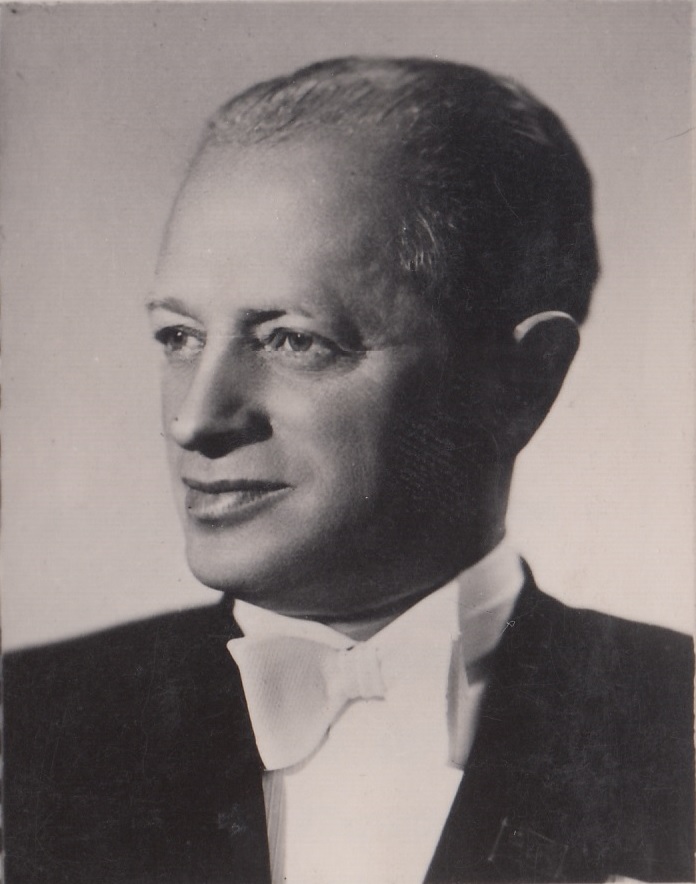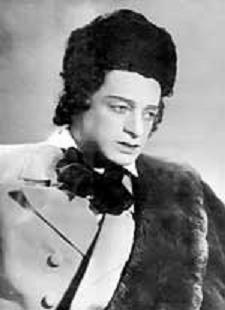Isidar Balotsin (original name: Izrail Ruvimavich Balotny) was born on August 26th (September 8th), 1907 in Babrujsk, Belorussia, into a
Jewish family.
Lyric-dramatic tenor. He was the first artist to be awarded the title of a People's Artist of the Belarussian Soviet Socialist Republic
(1944), and is considered the first major Belarussian tenor.
Already as a child, he decided to become a musician. He was addicted to opera at a very young age and many times, he would spend the
little money he had just to buy a ticket for the opera.
As a young man, he worked at a wood processing plant and sang in an amateur troupe headed by Evgenij Tikotskij, who later became a famous
composer, and who supported and encouraged the young singer to further develop his skills.
In 1927, Balotsin went from his home town to study at the Minsk Musical College. When he saw how many young men and women tried to get
accepted to the college he, according to his own words, "got cold feet and almost went back home". But at the same time he, again according
to his own words, "felt that for some reason luck would follow me this time". And he was right. At the examination, his talent was noticed
by the famous Russian tenor (and ex-colleague of Shaljapin) Anton Bonachich, who had been
sent to Minsk by the authorities to evaluate the possibility of forming a professional opera troupe. But Bonachich did not leave it at that,
and spent a considerable amount of time coaching Balotsin.
Thus, Balotsin was a member of the pioneer group of singers that were in fact the founders of the Belarussian national opera. Starting from
1933, he was a soloist of the Belarussian Opera Theater.
Minsk Opera
During his 30-year career, he performed in 60 leading roles including Faust (for the first time in Belorussia), Werther, Cavaradossi,
Lenskij, Dubrovskij, Vodemon, Almaviva, Nadir, Simpleton, Duca and so on, but also Pan Damazy (in Straszny dwór by Moniuszko),
Konrad (in Tsvetok schastja/Flower of happiness by Aljaskej Turankoŭ/Turenkov, 1886–1958), Mikhas (in Mikhas Padgorny, Belarussian opera by
Evgenij Tikotskij, 1893–1970), Sjomka (Alesja by Tikotskij) or Saŭka (V pushchakh Palessja/In the forests of Polesia by
Anatol Bagatyroŭ/Bogatyrev, 1913–2003).
It was noted many times that one of the biggest merits of his singing was its enormous emotional power.
Almost all of his family members were killed by the Nazis in World War II in the town of Babrujsk. It was a great blow for him, and he
subsequently suffered two heart attacks.
He performed in Moscow, St. Petersburg and other cities with great success. As luck would have it, on his first concert in Moscow, he had
to replace the famous and much appreciated bass-baritone Anatolij Dolivo, and the public was extremely disappointed, but when Balotsin
started to sing, the public was enchanted and finally stood to a long ovation at the end of the concert. Since that time, he was a much
welcome guest in all the major cities of the USSR.
After some years at the Minsk Opera Theater he had gained a great reputation, and was the one to evaluate new singers, accept them to the
opera troupe, and help them to make the most of their talent.
Many of his devoted followers and also ordinary people who turned to him for help and wrote him letters, confirm that he was extremely
kindhearted, and almost never turned down a sincere request for help, while trying to answer almost all of the letters that were written
to him by the public. After the war, he was one of the symbols of the spiritual resurrection of war-torn Belorussia. Isidar Balotsin was
also a member of the Belarussian Soviet Socialistic Republic parliament and a prominent public figure, enjoying immense respect.
Balotsin died on July 12th, 1961.
I wish to thank Igor Milner for the picture (top), the biography and the recordings.


